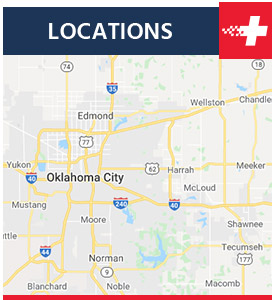Bloated Stomach Treatment Specialist Q&A
Proper treatment for a bloated stomach is essential for relieving discomfort and addressing potential underlying causes. Consult Dr. Kevin Penwell (D.O.) and our experienced team to explore effective solutions tailored to your needs. For personalized care, contact us today or book an appointment online. We have convenient locations to serve in West Moore OK, Norman (HealthPlex) OK, Norman (24th) OK, Edmond OK, Yukon OK, I-240 and Sooner RD OK, Tecumseh OK, and Choctaw OK.


Table of Contents:
What is a bloated stomach?
What causes bloating?
Why is my stomach so bloated every time I eat?
When should I worry about stomach bloating?
Bloating can occur due to gas accumulation from swallowing air or consuming gas-producing foods, indigestion, constipation, water retention, and certain medical conditions like irritable bowel syndrome (IBS), lactose intolerance, GERD, and hormonal imbalances. Common symptoms of bloating include a feeling of abdominal fullness or distension, gas and flatulence, abdominal pain, and rumbling sounds in the belly. If you experience frequent bloating or if it is accompanied by severe symptoms, seeking prompt medical attention is crucial.
If you have a bloated stomach, you may feel unease, or pain in your abdominal area. Bloating is often caused by a buildup of gas in the stomach and intestines, which can be influenced by factors such as nutrition, lifestyle, and medical disorders.
We recommend eating smaller meals throughout the day, taking time to eat and chew your food thoroughly, avoiding gas-causing foods and drinks, and maintaining an active lifestyle. Addressing bloating can often involve a combination of over-the-counter remedies, probiotics, medications for indigestion or constipation, stress management techniques, and regular exercise.
However, if bloating continues to be a problem, consider keeping a food diary to identify potential triggers, or consult with our healthcare providers for further evaluation.
Experiencing bloating is a frequent concern, often stemming from various factors such as overeating, consuming foods that produce gas, food intolerances, gastrointestinal disorders, hormonal fluctuations, stress, anxiety, or certain lifestyle habits. Bloating can be triggered by eating too much or too quickly, as well as by foods like broccoli, beans, cabbage, onions, and carbonated beverages. If you’re uncertain about the cause, we can assist in pinpointing potential triggers and recommend dietary adjustments to alleviate the issue.
For those with food intolerances like lactose or gluten, we can assist in managing symptoms and adjusting your diet. We also recognize the significance of the gut microbiome in overall health and can offer advice on maintaining a healthy balance of gut bacteria.
Gastrointestinal disorders such as IBS, GERD, celiac disease, and constipation can also lead to bloating. We’re equipped to diagnose and manage these conditions, offering guidance on symptom management. Hormonal changes, particularly during menstruation or pregnancy, can contribute to bloating, and we provide comprehensive women’s health services to help manage these symptoms.
Stress and anxiety are other potential causes of bloating, and we take a comprehensive approach to healthcare, understanding the connection between mental and physical health. Additionally, lifestyle factors like smoking or a sedentary lifestyle can exacerbate bloating. We offer guidance on healthy lifestyle changes and can discuss any potential medication side effects that may be contributing.
If bloating persists, it’s essential to rule out serious conditions like ovarian or colon cancer. If you’re experiencing chronic bloating, it’s important to seek further evaluation.
Bloating often occurs after meals and can be triggered by various factors, such as overeating, high-fat foods, certain types of foods and drinks, dietary sensitivities, and swallowed air. When the stomach is stretched due to excessive food intake, or when high-fat foods slow down digestion, it can create a sensation of fullness and bloating. Certain foods and drinks, like carbonated beverages, beans, lentils, broccoli, onions, and wheat, are known to produce gas, contributing to this uncomfortable feeling.
Dietary sensitivities, such as lactose or gluten intolerance, can also hinder the digestive system’s ability to process specific foods, leading to bloating. Additionally, conditions like aerophagia, where excess air is swallowed while eating or drinking, can cause bloating. Constipation, often due to inadequate fiber intake, dehydration, or other medical conditions, is another common contributor to bloating.
An imbalance in the gut microbiome can interfere with digestion and lead to bloating, potentially indicating more serious conditions such as irritable bowel syndrome, inflammatory bowel disease, or gastroparesis.
We’re here to help you identify and avoid foods that trigger bloating, improve digestion, manage constipation, and provide medical care for persistent or severe bloating. Our approach focuses on understanding the root causes and implementing effective strategies to ensure your comfort and well-being.
Stomach bloating, marked by a sensation of fullness and pressure in the abdomen, is a common issue often caused by excessive gas or digestive disturbances. However, persistent or severe bloating may signal an underlying medical condition.
We advise seeking medical evaluation if you experience:
– Persistent or chronic bloating
– Severe pain or discomfort
– Changes in bowel movements
– Fever or chills
– Nausea or vomiting
– Weight loss or nutrient deficiencies
– Bloating after eating specific foods
– Bloating during pregnancy
Bloating can also indicate serious conditions such as liver disease, heart failure, kidney issues, or, in women, ovarian cancer. It’s crucial to consult a doctor immediately if you notice any of these symptoms.
Additional risk factors include a history of gastrointestinal conditions, a family history of such disorders, certain medications, or recent travel to areas with poor sanitation.
Timely medical attention is crucial for effective management and improved outcomes. If you’re concerned about persistent bloating or associated symptoms, don’t hesitate to seek care. Contact us today to receive the quality healthcare you deserve.
Struggling with a bloated stomach can be more than just uncomfortable; it can signal deeper health issues. Our dedicated team is here to provide effective solutions and personalized care to address your concerns. Don’t let bloating take over your days. Contact us or book an appointment online to start your journey toward a healthier, more comfortable you. We have convenient locations to serve in Oklahoma City, OK. We serve patients from West Moore OK, Norman (HealthPlex) OK, Norman (24th) OK, Edmond OK, Yukon OK, I-240 & Sooner RD OK, Tecumseh OK, Choctaw OK,
and Bethany OK.


Additional Services You May Need
▸ Urgent Care Services
▸ Illness + Injuries
▸ On Site Lab + X-Ray
▸ Helpful Health
▸ Motor Vehicle Accidents
▸ Drug Testing
▸ MRO
▸ UTI Treatment
▸ Employment Physicals
▸ Workers Comp
▸ Strep Throat Treatment
▸ Pregnancy Testing
▸ Blood Pressure Testing
▸ Urinalysis
▸ Mononucleosis Treatment
▸ Suture Removal
▸ Respiratory Syncytial Virus
▸ OccMed








